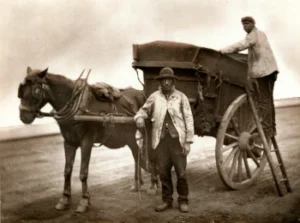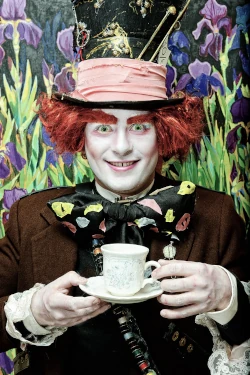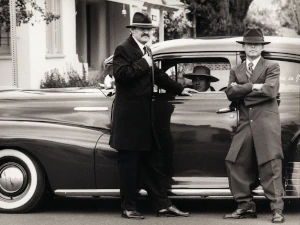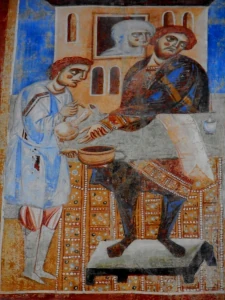Vocabulary: 8 Common English Phrases with Surprisingly Dark Origins –
What do criminals, horse-drawn carriages, and hats have in common? They all helped shape the way we speak English today!
English is full of strange and colorful expressions that don’t always make sense at first. You might have heard someone say they were “riding shotgun” or that a new movie was a “blockbuster.” These phrases are common, but their origins might surprise you—and some come from pretty unusual or even dark places!
Here are eight everyday English expressions with surprisingly dramatic backstories.
1. Saved by the bell

Image by Yoksel on Unsplash
Meaning: Rescued at the last possible moment.
Example: I didn’t finish my homework, but class ended before the teacher could check—I was saved by the bell!
Origin: Many people associate this phrase with the sport of boxing. In a boxing match, if a fighter is getting badly beaten, the bell that rings to end the round can save them from further hits and provide a chance to rest. It’s a last-minute rescue—just in time!
Another theory (less likely but more famous) is that the phrase comes from old fears that people had of being buried alive by mistake—that a doctor may believe someone is dead when they are actually still alive. It is said that some people insisted that their coffin include a little string tied to a bell that was located above ground. If they suddenly woke up alive inside the coffin, they could pull the string to ring for help. They would truly be ‘saved by the bell’!
2. Riding shotgun

Image by LSE Library on Unsplash
Meaning: Sitting in the front passenger seat of a car.
Example: I call shotgun! You had it last time; it’s my turn!
Origin: The second entry on our list of common English phrases goes back to the days of the Wild West in America. When stagecoaches carried passengers and mail through dangerous areas, someone would sit on top of the coach next to the driver—often holding a shotgun to protect the coach from bandits. That passenger seat became known as the “shotgun” seat. Today, ‘riding shotgun’ is still popular—but hopefully less dangerous!
3. Blockbuster

Creative Commons: “RAF Typhoon Dropping Paveway Bomb” by Defence Images
Meaning: Something extremely successful or exciting, often used for movies.
Example: The new superhero movie was a total blockbuster!
Origin: Today, saying the word “blockbuster” makes us think of popcorn and movie theaters. In fact, Blockbuster was the name of a very popular chain of movie rental stores in the days before Netflix and video streaming. However, the term originally described a type of massive bomb used by Britain’s Royal Air Force during World War II.
These bombs were so powerful, they could destroy entire city blocks. Decades later, the word came to be used to describe movies so popular and impressive, they “blew away” the competition—and blew away amazed audience members as well.
4. Mad as a hatter

Creative Commons: “The Mad Hatter” by seanmcgrath
Meaning: Completely crazy or strange.
Example: My uncle loves extreme sports like cliff diving. He’s a lot of fun, even if he is as mad as a hatter!
Origin: Nowadays, ‘mad’ is usually a synonym for angry, but in Old English this word meant crazy or insane. This older definition of the word is featured in Lewis Carroll’s fictional book Alice’s Adventures in Wonderland, where the Mad Hatter is a character well-known for his strange behavior. Yet most people probably don’t know the expression ‘mad as a hatter’ has real-life historical origins.
In the 18th and 19th centuries, hat makers (also called milliners) used a chemical element called mercury to help shape hats made of felt, which is a soft material. Mercury is toxic to humans, and over time, it affected the hat makers’ nervous systems, causing tremors, confusion, and strange behavior. People noticed, and the phrase ‘mad as a hatter’ was born.
5. Pulling my leg

Image by Katherine Bowers on Pexels
Meaning: Joking or trying to fool someone in a playful way.
Example: You got front-row seats to the concert? Are you pulling my leg?
Origin: The exact origin of this popular expression is unclear, but several possibilities exist. One theory says, in the past, thieves in crowded areas would trip someone by grabbing or tugging at their leg, distracting them so another thief could steal from them. In a similar way, some suggest the phrase comes from the practice of street beggars, who pull on the pant-leg of people passing by to ask them for money. A third possibility relates to a particularly dark way to speed up the death of a criminal who is being executed by hanging. Whatever the origin may be, over time ‘pulling my leg’ became exclusively a lighthearted way to ask someone, “Are you kidding me?”
6. Drink the Kool-Aid

Creative Commons: “Jonestown Houses” by Fielding McGehee and Rebecca Moore
Meaning: To blindly follow an idea or group, even if it’s not a good one.
Example: He believes everything his favorite social media influencer says. He really drank the Kool-Aid.
Origin: This phrase comes from a tragic event that happened nearly 50 years ago. In 1978 at a place called Jonestown, more than 900 members of a religious group all died on the same day by taking a flavored drink that had been poisoned by their leader. (The drink wasn’t actually the fruit-flavored drink Kool-Aid, but unfortunately the popularity of the Kool-Aid brand led people to associate it with this event. I’m sure the executives of the Kool-Aid company aren’t happy about this connection.) The mass suicide at Jonestown shocked people all over the world, and eventually led to increased legal protections for people who might be influenced by leaders with evil intentions.
While the origin of this phrase is very serious, today it is often used more lightly to describe someone who goes along with something or trusts a group of people without thinking critically—like buying into a new trend just because everyone else is.
7. Wash your hands of something

Creative Commons: “‘Pontius Pilate washes its hands’ – fresco (1072-1087)” by Carlo Raso
Meaning: To stop being involved with something; to say, “This isn’t my problem anymore.”
Example: After trying to fix the group project five times, I’m washing my hands of it.
Origin: This phrase goes back around 2,000 years. The Bible gives the history of the life of Jesus—the central figure of the Christian faith. At the end of Jesus’ life on earth, he was arrested and sentenced to death, though he had done nothing wrong.
The Roman governor Pontius Pilate, who was in charge, interviewed Jesus and declared to the people that he could find no reason to put him to death. The crowds of people, however, pressured Pilate to carry out the punishment. As a way to symbolically demonstrate that he disagreed and would not take responsibility for the death, Pilate washed his hands in front of all the people, declaring that he was innocent of any wrongdoing in the matter. Today, we use the phrase ‘wash your hands of it’ when we want to step away from a situation and not be blamed for the problems.
8. For whom the bell tolls

Creative Commons: “Book of Hours, Rabbit tolling church bells” by Walters Art Museum Illuminated Manuscripts
Meaning: A reminder that another person’s loss or death affects everyone.
Example: During sports events, the sound of a tolling bell is sometimes played in the stadium to represent that the visiting team is under pressure and in danger of losing the game.
Origin: This serious-sounding phrase comes from a 17th-century poetic writing by English poet John Donne. At that time, church bells were rung to announce a death. Donne wrote, “Never send to know for whom the bell tolls; it tolls for thee,” meaning that when one person dies, it affects all of us because we’re all part of the same human family.
The phrase later became the title of a famous novel by Ernest Hemingway, but its message remains timeless: all people are connected to each other and will share the same experiences throughout life, both happy and sad.
The ways in which history lives on through the words we use every day are amazing, aren’t they? Whether the origin of expressions is light-hearted or surprisingly dark, knowing about it gives great insight into the experiences of past generations.
Next time someone calls “shotgun” or says they’re “pulling your leg,” you’ll know there’s a whole story behind those words!
Thanks for spending some time with the origins of these common English phrases. Feel free to comment below with examples or more questions.
If you’d like to learn more about how ESOL Advantage tutoring can help you take your English skills to the next level, reach out to me today at moc.e1744700521gatna1744700521vdalo1744700521se@pk1744700521ram1744700521 or connect through our Contact Form.
You may also enjoy my article about the correct way to use the words normal, typical, and regular
Note: As an Amazon Associate, I earn from qualifying purchases, at no additional cost to you. Recommended resources are carefully selected and help support the operation of my blog, so thank you for clicking!



0 Comments